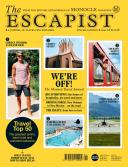
The Escapist
We’re off! The Monocle Travel Annual: where to explore, stay, set sail and stretch out.
In This Issue
Oops! No content was found.
Looks like we no longer have content for the page you're on. Perhaps try a search?
Return Home
Click here to discover more from Monocle

We’re off! The Monocle Travel Annual: where to explore, stay, set sail and stretch out.
Looks like we no longer have content for the page you're on. Perhaps try a search?
Return Home